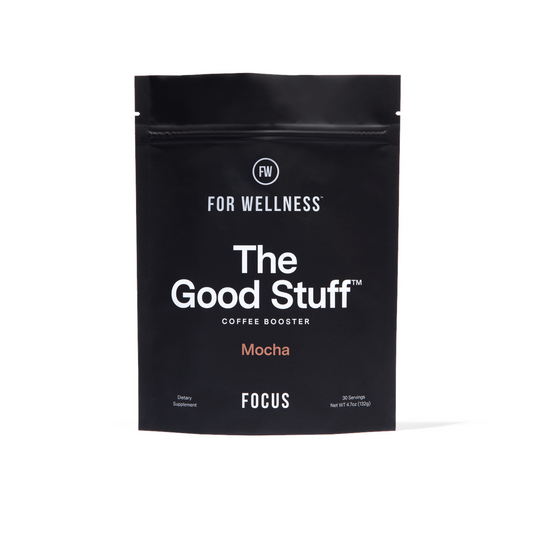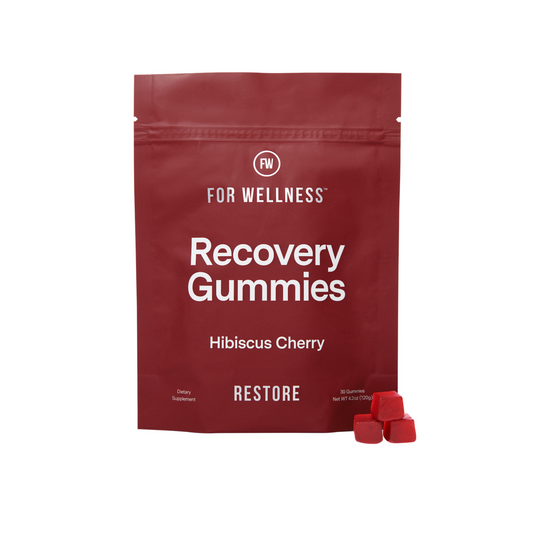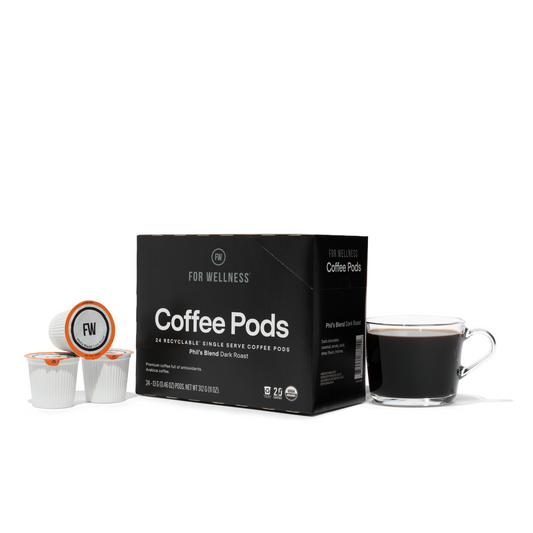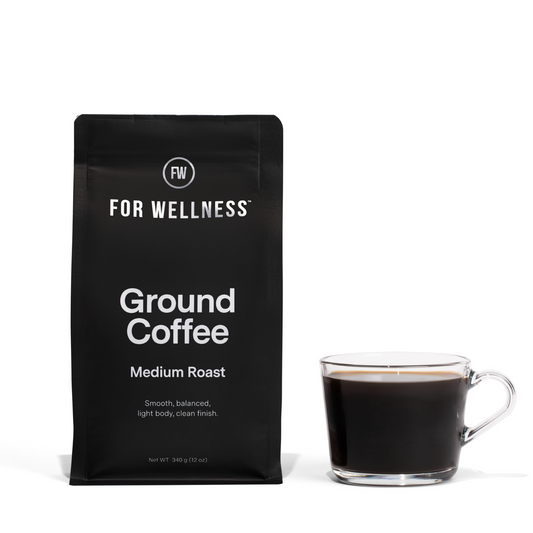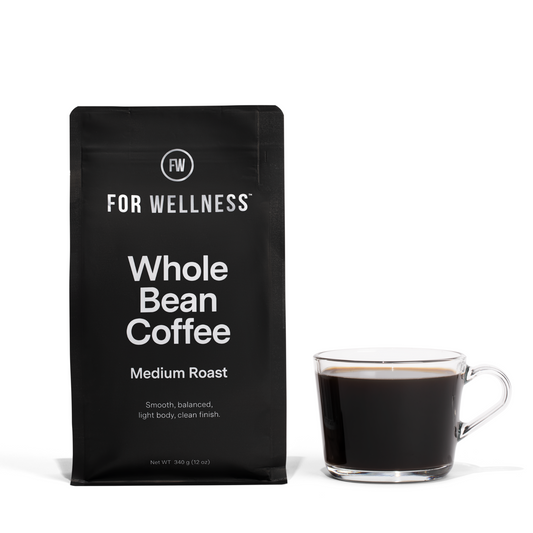As we age, our bodies undergo countless changes—some visible, many hidden. One of the most significant yet subtle shifts is the rise of chronic, low-grade inflammation known as inflammaging. This process is now recognized as a key driver of many age-related diseases, from heart disease and diabetes to dementia and frailty.
The good news? While aging is inevitable, there are powerful steps you can take to slow inflammaging and promote healthier, more vibrant years ahead.
What Is Inflammaging?
Inflammaging—a blend of “inflammation” and “aging"—describes the chronic, sterile (non-infectious), low-level inflammation that develops with advancing age. Unlike the acute inflammation that helps heal wounds or fight infections, inflammaging simmers quietly in the background, often going unnoticed until it contributes to tissue dysfunction or chronic disease.


The Good Stuff - Performance
-
One scoop will infuse your coffee with healthy ingredients
-
Ditch the bad stuff like sugar, dairy, and artificial creamers
-
Fights inflammation and supports skin and joint health
-
Makes your coffee taste great
Why Does Inflammaging Happen?
Several interconnected factors drive inflammaging:
-
Immune System Changes: As we age, the immune system’s ability to regulate inflammation becomes less precise. The adaptive immune system weakens, while the innate immune system becomes overactive, leading to increased production of pro-inflammatory molecules.
-
Cellular Senescence: Aging cells can enter a state called senescence, where they stop dividing but release inflammatory substances (the “senescence-associated secretory phenotype” or SASP)
-
Oxidative Stress: Accumulated damage from free radicals (oxidative stress) promotes inflammation and accelerates cellular aging.
-
Lifestyle and Environmental Factors: Poor diet, inactivity, obesity, smoking, chronic stress, and environmental toxins all contribute to the inflammatory burden.
The Health Impact
Inflammaging is linked to a wide range of age-related conditions, including:
- Cardiovascular disease
- Type 2 diabetes
- Osteoarthritis and joint pain
- Cognitive decline and dementia
- Cancer
- Frailty and muscle loss
Steps to Reduce and Prevent Inflammaging
While you can’t turn back the clock, you can take action to reduce chronic inflammation and promote healthier aging. Here’s how:
1. Adopt an Anti-Inflammatory Diet
What you eat profoundly influences inflammation. Focus on:
-
Fruits and Vegetables: Rich in antioxidants and polyphenols, these help neutralize free radicals and reduce inflammation. Aim for a colorful variety of leafy greens, berries, citrus, cruciferous veggies, and more.
-
Whole Grains: Oats, brown rice, quinoa, and whole wheat provide fiber, which supports gut health and lowers inflammation.
-
Healthy Fats: Omega-3 fatty acids (found in fatty fish like salmon, walnuts, flaxseeds) and monounsaturated fats (olive oil, avocados, nuts) are anti-inflammatory.
-
Lean Proteins: Fish, poultry, legumes, and plant-based proteins are preferable to red and processed meats.
Foods to Avoid:
-
Highly processed foods
-
Refined carbohydrates (white bread, pastries)
-
Sugary snacks and drinks
-
Red and processed meats
-
Fried foods
-
High-fat dairy
2. Maintain a Healthy Weight
Excess body fat, especially around the abdomen, is a potent source of pro-inflammatory molecules. Obesity is strongly linked to increased risk of heart disease, diabetes, cancer, and dementia are all conditions associated with inflammaging. Losing even a modest amount of weight can significantly reduce inflammation.
3. Stay Physically Active
Regular exercise is one of the most effective anti-inflammatory tools:
-
Aerobic Exercise: Brisk walking, cycling, swimming; aim for at least 30 minutes most days.
-
Strength Training: Helps preserve muscle mass and bone density.
-
Mind-Body Practices: Yoga, Tai Chi, and meditation not only reduce physical inflammation but also help manage stress, another key driver of inflammaging.
4. Quit Smoking
Smoking is a well-known trigger of systemic inflammation and dramatically increases the risk of rheumatoid arthritis, heart disease, and other inflammatory conditions. Quitting smoking is one of the most impactful steps you can take for your health at any age.
5. Manage Stress
Chronic stress elevates stress hormones (like cortisol), which can fuel inflammation. Effective stress management techniques include:
- Meditation
- Deep breathing exercises
- Yoga or Tai Chi
- Guided imagery
- Spending time in nature
- Social connection
6. Prioritize Quality Sleep
Poor sleep or chronic sleep deprivation increases inflammation and accelerates aging. Aim for 7–9 hours of restorative sleep per night. Establish a regular sleep schedule, limit screen time before bed, and create a calming bedtime routine.
7. Consider Cold Exposure
Emerging research suggests that cold showers or ice baths may help reduce chronic low-grade inflammation. While not for everyone, cold exposure (as practiced in the Wim Hof Method) has shown promise in lowering inflammatory markers, similar to some medications.
8. Regular Health Check-Ups
Routine screenings for blood pressure, cholesterol, blood sugar, and inflammatory markers can help catch problems early. Discuss any health changes with your doctor, and work together to manage chronic conditions that can fuel inflammation.
The Science Behind Inflammaging
Cellular and Molecular Drivers
-
Senescent Cells: These “zombie” cells accumulate with age, secreting inflammatory cytokines, chemokines, and proteases that disrupt tissue function and promote disease.
-
Dysregulated Immune Response: The balance between pro- and anti-inflammatory signals becomes skewed, with increased circulating cytokines (like IL-6, TNF-alpha, and CRP).
-
Oxidative Stress: Free radicals damage DNA, proteins, and cell membranes, triggering further inflammation and accelerating the aging process.
-
Microbiome Changes: Aging alters the gut microbiome, which can increase gut permeability (“leaky gut”) and systemic inflammation.
Inflammaging vs. Acute Inflammation
| Feature | Acute Inflammation | Inflammaging (Chronic) |
|---|---|---|
| Promotes disease |
Action Plan: Your Anti-Inflammaging Checklist
- Eat a colorful, plant-rich, whole-foods diet
- Exercise regularly (aerobic + strength + mind-body)
- Maintain a healthy weight
- Don’t smoke
- Manage stress with proven techniques
- Prioritize sleep
- Consider safe cold exposure if interested
- See your doctor regularly
Conclusion
Aging is inevitable, but how we age is, to a large extent, within our control. By understanding inflammaging and taking proactive steps to reduce chronic inflammation, you can add not just years to your life, but life to your years. Start with small, sustainable changes; your future self will thank you.



